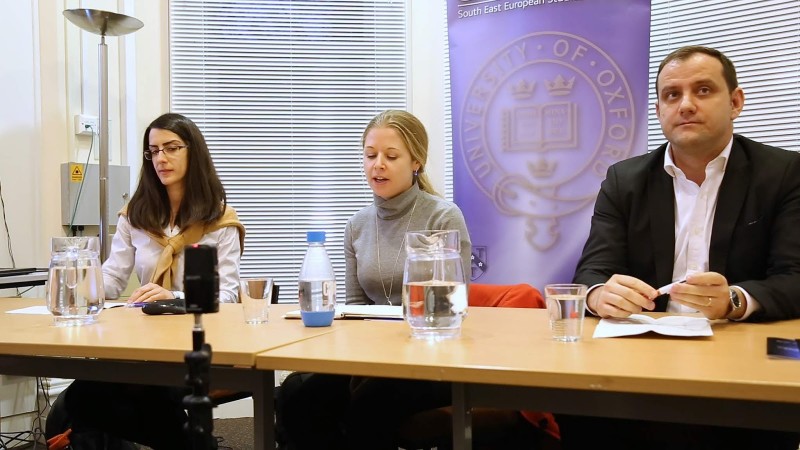- Home/
- News
Radicalisation in the Western Balkans: Political, social or religious?

Photo: Seminar on Radicalisation in the Western Balkans: Political, social or religious? (Oxford) Source: seesoxblog.blogspot.com
Radicalisation in the Western Balkans is often portrayed as the growing
influence of radical Islam. Does this stand up to rational analysis and
how do political and social factors fit in? These were some of the
questions that Asya Metodieva (Central European University) and Florian
Qehaja (Kosovar Centre for Security Studies) tried to address during the
seminar on Radicalisation in the Western Balkans: Political, social or
religious?, which took place on 29 January 2020 and was chaired by
Jessie Barton Hronesova (Queen Elizabeth House, Oxford).
Qehaja
explained that there were a significant number of foreign terrorist
fighters (FTFs) coming from the Western Balkans and noted that there are
different kinds of radicalisation and extremism in the region - driven
by the Orthodox Church, by nationalism, etc. The issue of radical Islam
in the Western Balkans came about after the conflict through a wave of
NGOs using the post-conflict environment to promote non-indigenous to
the region ideologies.
While the roots of radicalisation were
slightly different in the various countries in the Western Balkans (e.g.
depending on whether the country is secular or influenced by the
Orthodox Church), in the end they were quite similar. Identity crisis of
the individual, corruption, state capture, loss of hope and protagonism
were all roots of radicalisation. 40% of the Kosovo FTFs had some sort
of criminal background, which made them easy targets for recruiters.
Enlargement fatigues also gave ammunition to recruiters and allowed them
to argue that the West is not the answer for the future.
Qehaja pointed to the lack of proper security
cooperation between the Western Balkan countries, caused by political
positioning and conflicts in the region, as an obstacle to positive
developments. Despite this, a lot had been achieved in the region in the
last five years, especially in terms of providing information, raising
awareness and building resilience. The role of the family, of local
communities, a strong national identity element and secularism are
factors that counteract the appeal of recruiters. The repatriation by
Kosovo of 110 FTF family members was also a positive step, however there
might be potential problems due to lack of capacity to monitor the
returnees.
In terms of possible improvements for the future,
Qehaja suggested that local and Muslim communities should be involved
more. There was a need for greater mobilisation of municipalities and
community leaders and it was important to refrain from using alienating
and stigmatising language.
Metodieva focused her presentation
on the specificities of radicalisation in post-conflict societies and
the role of mid-level leadership in the recruitment process. FTFs were
just the tip of the iceberg, the final step in a long process, which had
sometimes taken years to complete. It was in this process of creating
radical communities and providing them with a sense of identity that
that the role of mid-level recruiters as the driving force of the
radicalisation process could truly be seen.
Radicalisation in
the Western Balkans was the result of the combined effects of framing
and context. The post-war period, characterised by the destruction of
the welfare system and lack of opportunities, had led to the creation of
fragile societies and an identity crisis within society. It was in this
context that recruiters could build radicalised micro-societies.
This
was confirmed when looking at the geography of FTF mobilisation in the
Western Balkans. That mobilisation followed the trajectory of recruiters
who were active and present in the region and who had managed to build
domestic networks. Metodieva stressed the importance of mid-level
leadership in creating informal structures and in building a trust
relationship, so that radicalised people would turn to them in case of
need, rather than to their family, a teacher or the official
authorities. The role of local recruiters included not only preaching,
but a variety of other functions, such as maintaining influence at
community level, providing logistical and financial support and building
an image of spiritual authority.
Metodieva concluded her
presentation by summarising her four key hypotheses: radicalisation in
the Western Balkans was the by-product of war and post-war fragility;
targeted activity of mid-level leaders had led to the appearance of
radicalised micro-communities; global ideologies were translated to the
local war/post-war context; the FTF phenomenon depended on the existence
of active positive relationships with the local leaders.
In
the discussion that followed a number of issues were raised, such as
whether there are specific characteristics common to people who become
radicalised; the differences in the radicalisation process in the
different Western Balkan countries; the stance of official Islamic
institutions towards radical imams; the role of Turkey, Russia and China
in the region; prevention mechanisms; the role of the diaspora;
Orthodox right wing, nationalist and ethno-nationalist extremism.
Mirena Pencheva (EU Visiting Fellow, St Antony's College, Oxford)
Source: Link


 Development of specialized PCVE web site is funded by EU FUNDS CN 2017-386/831 - "IPA II 2016 Regional Action on P/CVE in the Western Balkans"
Development of specialized PCVE web site is funded by EU FUNDS CN 2017-386/831 - "IPA II 2016 Regional Action on P/CVE in the Western Balkans"